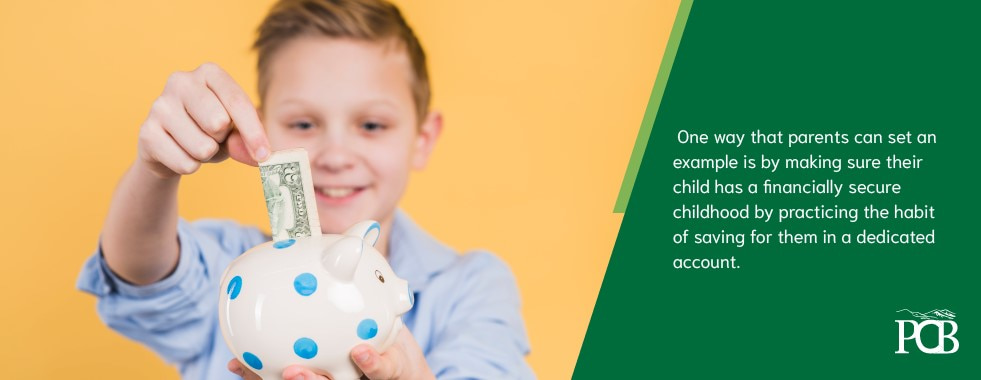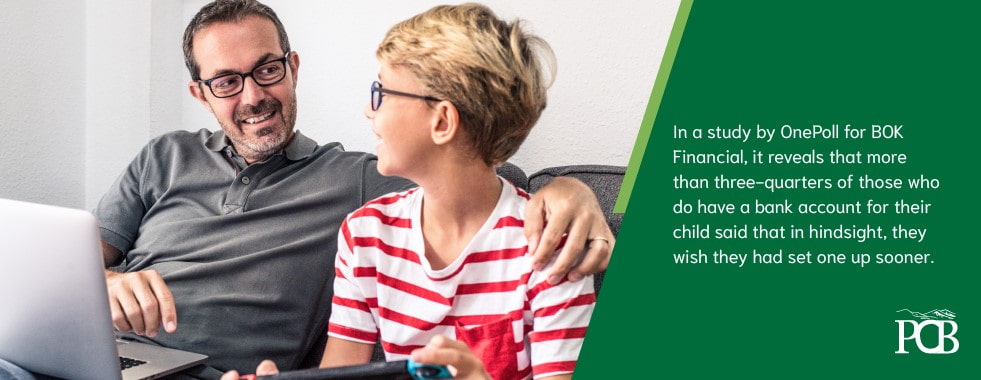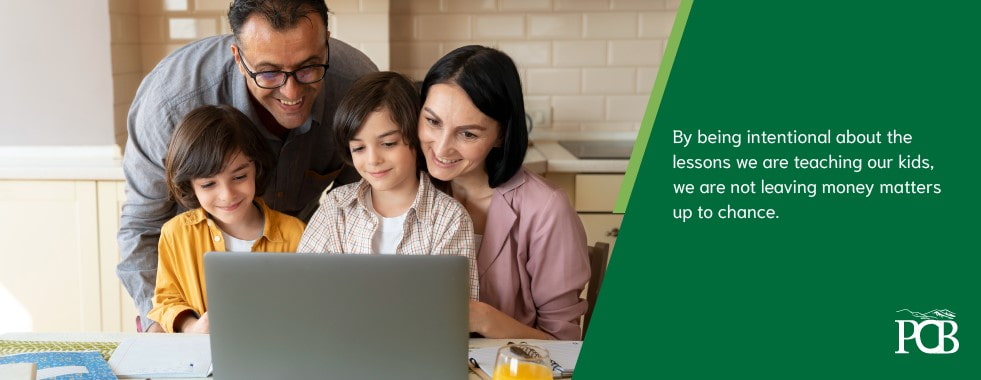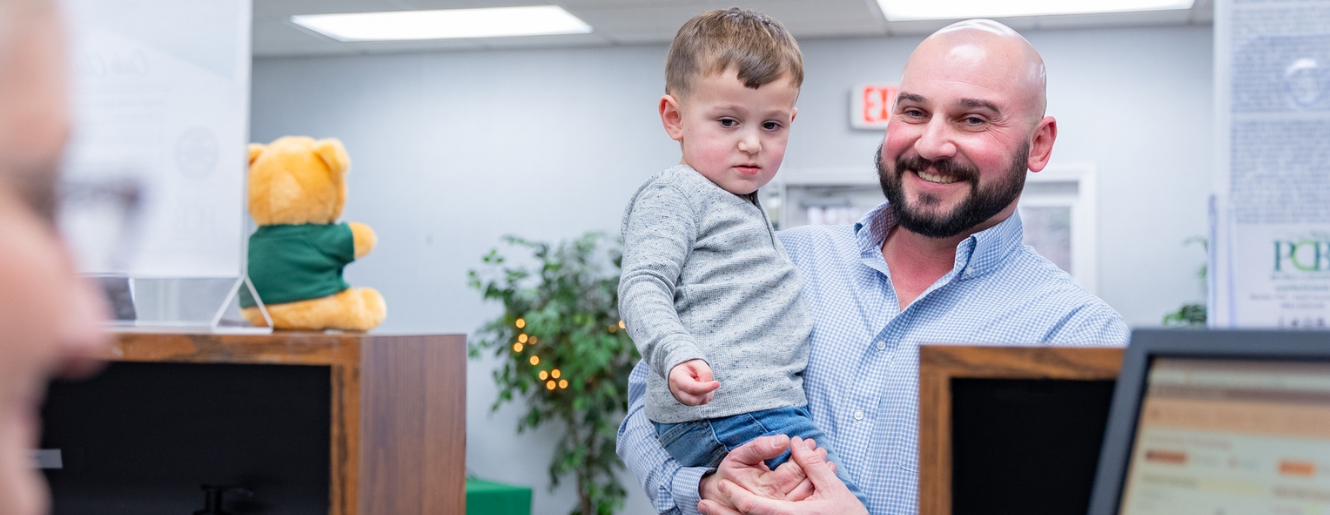
Across Virginia and West Virginia, organizations are working hard to expand financial literacy in school-aged children.
At PCB we believe that financial literacy should be a focus of education for even the youngest members of our community. Parents often shy away from discussing money in front of their children, and, as a result, many young adults unknowingly make financial mistakes and fall into debt early.
April is Financial Literacy month and a great time to talk about the basics of adult finances with your children. Explaining bank accounts and letting kids experiment with their own money can teach them how to budget for rent and groceries in the future.
Your personal finances don’t have to be perfect in order to share these lessons with your kids! Share what you know and what you wish you’d known about money, banking, and financial security. Here are our top tips for initiating financial discussions with your children and empowering them to create strong financial futures.

Teach them how money is earned
Understanding money can be tough for kids. To them, it may seem like money just pops out of an ATM or adults can just swipe a credit card for anything they want. The first step in growing financial literacy for kids is teaching them where money comes from.
Giving kids chores in exchange for money can help them understand the process of earning an income. Working for cash assigns value to a dollar and helps make the whole idea of money more real.
Teach them the value of saving
For most kids, the concept of saving money is a much harder lesson than earning it. The next time your child asks for something they’ve seen on TV or in the toy aisle, take the opportunity to turn that item into a savings goal.
Offer them chores in exchange for cash or encourage them to save any monetary gifts that may be coming up for their birthday or holidays. Make a plan with your child to save for the things they want, and they will carry this mindset into adulthood.
Saving money helps teach children both patience and the value of money. A PCB Cub Club kids savings account can help your child achieve saving success. Opening a youth savings account with your child provides banking experience and creates a routine around saving. After opening a Cub Club account, review your child’s monthly bank statement with them. This will build familiarity with reading financial statements as they watch their savings grow.

Teach them budgeting basics
Learning how to create, maintain, and follow a budget is a crucial financial skill. Share your monthly budget with your kids. Seeing where money is spent each month helps demystify your income. Many kids think that $1000 a month is a lot of money until they see the cost of housing, utilities, gas, and groceries.
Since most children won’t have the responsibility of paying monthly bills, it’s important to involve them in your household budget. If they are asking for a new digital subscription, complaining about your home cooked meal, or yearning for the newest shoes in school, show them the monthly budget. Calmly discuss how extra purchases must be accounted for and brainstorm ways to accommodate their requests.
Teach them to comparison shop
When the time comes for your child to access their youth savings account and buy the thing they’ve been dreaming of, introduce your child to comparison shopping. It may surprise some kids to learn that different stores have different prices. Helping them find the best price for their item further instills the value of a dollar and teaches them that persistence and patience can save money.
If your kids aren’t ready for a major purchase, you can teach the value of comparison shopping by including your kids in your grocery shopping. Whether you plan your meals based on sales or check prices between multiple grocery stores, these comparison shopping tactics will help your kids make smart purchases in the future.

Teach them about investing
Many parents teach about budgeting and saving but stop there. The only way to truly build wealth and be financially secure is to invest. The most important tips for investing are that you start early and stay the course.
A good way to teach your kids about how investing works is to open a custodial account. They can begin to learn about stocks and bonds and risk tolerance. Let them pick a few stocks to start with and watch how they do. If you’re not ready to invest real money in your child’s account, set up a mock trading environment. Trading platforms like Webull offer paper trading simulations that allow children and adults to practice stock trading and test out financial strategies.
Teach them about credit cards
Credit cards are a blessing and a curse for most Americans. They grant you the ability to make purchases beyond the limits of your checking account but open the door to overspending and debt. Many parents don’t want to admit that they have credit card debt for fear of being bad role models. The truth is, the best lessons are learned from mistakes. Share your experiences with your children in order to help your kids avoid overspending in the future.
Some key lessons you can share about credit cards include:
- Credit cards have some of the highest interest rates of any loan.
- Once you accrue a balance, interest is added to your debt every month.
- Credit cards spend real money that you must pay back.
- Credit card debt can prevent you from buying a car or house.
- Let your kids understand how it works with our credit card payoff calculator.
Start the discussion today
No matter how old your children are, you can provide everyday opportunities for them to learn about finances and practice money management. Involving your children in financial decisions will help build responsibility and financial literacy for the future. Start today by opening a Cub Club student savings account. Not only will your children learn about saving and earning interest, they’ll also be rewarded with $5 from PCB for making the A/B honor roll or having perfect attendance in school.

Make the most of your family’s money
Feeling inspired to upgrade your current financial accounts? A PCB Kasasa Saver+ or Kasasa Cash+ account can help you earn more with high interest savings and checking. Make the most of your savings with a CD or IRA from PCB. Contact us today to discover which banking solutions are best for you.
Our friendly associates are here to help you and your children achieve your financial goals. Come by one of our convenient West Virginia branches in Franklin, Petersburg, Moorefield, Wardensville, Marlinton, Beckley, Mount Hope, or Oak Hill or stop by a PCB branch in Harrisonburg, Bridgewater, and Staunton in Virginia. We have the best banking solutions for your entire family.

